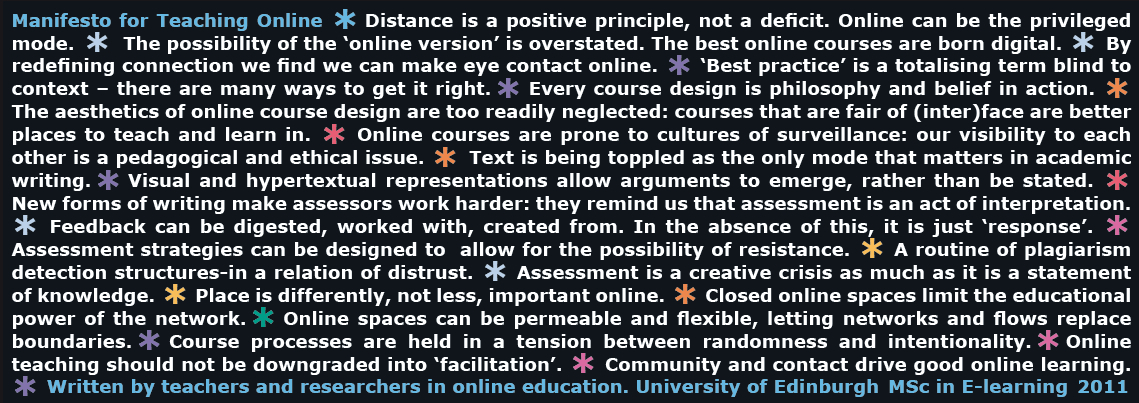See the ‘2016 manifesto’ page for the most recent manifesto.
Manifesto for teaching online – Written by teachers and researchers in online education. University of Edinburgh 2011
The PDF:
see or download the 2011 manifesto in PDF format

The video:
A manifesto for teaching online, 2013 remix on Vimeo. The video is an interpretation of the manifesto, commissioned from one of the students on the MSc in Digital Education programme, James Lamb. (see also the 2011 remix)
The text:
Distance is a positive principle, not a deficit. Online can be the privileged mode.
The possibility of the ‘online version’ is overstated. The best online courses are born digital.
By redefining connection we find we can make eye contact online.
‘Best practice’ is a totalising term blind to context – there are many ways to get it right.
Every course design is philosophy and belief in action.
The aesthetics of online course design are too readily neglected: courses that are fair of (inter)face are better places to teach and learn in.
Online courses are prone to cultures of surveillance: our visibility to each other is a pedagogical and ethical issue.
Text is being toppled as the only mode that matters in academic writing.
Visual and hypertextual representations allow arguments to emerge, rather than be stated.
New forms of writing make assessors work harder: they remind us that assessment is an act of interpretation.
Feedback can be digested, worked with, created from. In the absence of this, it is just ‘response’.
Assessment strategies can be designed to allow for the possibility of resistance.
A routine of plagiarism detection structures-in a relation of distrust.
Assessment is a creative crisis as much as it is a statement of knowledge.
Place is differently, not less, important online.
Closed online spaces limit the educational power of the network.
Online spaces can be permeable and flexible, letting networks and flows replace boundaries.
Course processes are held in a tension between randomness and intentionality.
Online teaching should not be downgraded into ‘facilitation’.
Community and contact drive good online learning.

Manifesto for teaching online is licensed under a Creative Commons Attribution-NonCommercial-ShareAlike 3.0 Unported License.
We still have a few paper postcards of the 2011 manifesto – email jen.ross@ed.ac.uk with your postal address if you would like one or more of these.
Thanks to Oliver Brookes for his design of the PDF, poster and postcard.
